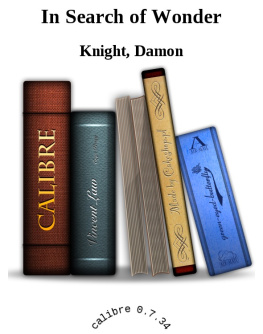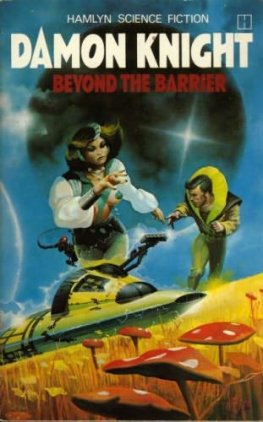Damon Francis Knight - In Search of Wonder
Here you can read online Damon Francis Knight - In Search of Wonder full text of the book (entire story) in english for free. Download pdf and epub, get meaning, cover and reviews about this ebook. year: 1967, publisher: Advent Pub Inc, genre: Art. Description of the work, (preface) as well as reviews are available. Best literature library LitArk.com created for fans of good reading and offers a wide selection of genres:
Romance novel
Science fiction
Adventure
Detective
Science
History
Home and family
Prose
Art
Politics
Computer
Non-fiction
Religion
Business
Children
Humor
Choose a favorite category and find really read worthwhile books. Enjoy immersion in the world of imagination, feel the emotions of the characters or learn something new for yourself, make an fascinating discovery.
- Book:In Search of Wonder
- Author:
- Publisher:Advent Pub Inc
- Genre:
- Year:1967
- Rating:5 / 5
- Favourites:Add to favourites
- Your mark:
- 100
- 1
- 2
- 3
- 4
- 5
In Search of Wonder: summary, description and annotation
We offer to read an annotation, description, summary or preface (depends on what the author of the book "In Search of Wonder" wrote himself). If you haven't found the necessary information about the book — write in the comments, we will try to find it.
In Search of Wonder — read online for free the complete book (whole text) full work
Below is the text of the book, divided by pages. System saving the place of the last page read, allows you to conveniently read the book "In Search of Wonder" online for free, without having to search again every time where you left off. Put a bookmark, and you can go to the page where you finished reading at any time.
Font size:
Interval:
Bookmark:
IN
SEARCH
OF
WONDER
essays on modernscience fiction
by damon knight
Revisedand Enlarged
Chicago:1967
Scanned & Proofed By MadMaxAU
* * * *
Contents
* * * *
INTRODUCTION TO THE FIRST EDITION
THEREARE FEW more misused words than criticism.
In one false sense, its used tomean restrictedly adverse (what authors call destructive) criticism,as if a favorable (constructive) evaluation could not be theresult of critical analysis.
And in another misprision, its usedto mean reviewing.
Reviewing is a lesser art, with amore immediate functional purpose. The reviewers objective is to express hisreactions to a work in such a way that the readers of a given periodical willknow whether or not they want to read it. The critic attempts to measure thework by more lasting and more nearly absolute standards, to determine itsplace, not for the reader of the moment, but for the cultivated mind viewingthe entire art of which this work forms a segment.
All of the rest of usHenry Bott, [ Forgive me, Dr.Asimov; those names are arranged alphabetically. ] Groff Conklin, August Derleth, Floyd C. Gale,Villiers Gerson, H. H. Holmes, J. Francis McComas, P. Schuyler Miller, HansStefan Santessonare primarily reviewers; damon knight, in most of hispublished assessments of science fiction and particularly in those gatheredhere, is a critic.
Professional criticism is extremelyrare in the science fiction field. God knows criticism of science fiction has beenmore than plentiful outside our orbit; but the critical contributions ofself-appointed scholars and intellectuals have been marked by equal portions ofdistaste for science fiction and complete ignorance of it. (Its worth notingthat one of Americas most esteemed journals of opinion recently asked WardMoore to contribute a critique of science fictionthen canceled the assignmentwhen an outline showed that the piece would be both informed and favorable.)
Within science fiction,criticismand frequently of a high order has appeared almost solely in amateurpublications; indeed the wealth of material, critical, bibliographical andbiographical, that has appeared in fanzines, from Fantasy Commentator toInside, is such that a university library with a complete fanzine filewould be the Mecca of Ph.D. candidates in the twenty-first century.
But damon knight [ Every time I typethat name I have to reassure myself that I have not been reincarnated asa cockroach. ] hasintroduced criticism into professional magazinespartly because he is equippedwith the background and intellect to do so (but then so are most of thereviewers mentioned above), and largely because his magazine outlets, if notalways the most affluent or the most widely circulated, have given him freerein and virtually unlimited space.
Most of us have free rein to theextent of being allowed to say precisely what we think (though at least one ofmy reviewing colleagues has been subject to arbitrary editorial revision of hisexpressed opinions), but were very tightly restricted in the matter of space,so that we are forced to present a persuasive (we hope) statement rather than aclosely reasoned analysis.
With all due respect to E. E. Smith,Ph.D., who has expended a good deal of serious research in statisticallytabulating the percentage of verdicts in which various reviewers and criticsare right or wrong, both reviewing and criticism are matters of opinion.There is no ultimate, absolute Esthetic Truth; and if you attempt to judge therightness or wrongness of others, you simply set yourself up as a reviewer ofreviewers, a critic of critics, and just as fallible as any of them.
Nevertheless, you tend to rate a manaccording to the extent to which his opinions agree with yours; but knight, byvirtue of the analytical, essayistic treatment made possible by his freedom inspace, has an all but unique quality: You can disagree completely on the bookin question, and still admire (and even to some extent agree with) thecritique.
Personally I find myself agreeingwith knight to an embarrassingly suspicious degree. [ In this volumeknight covers 81 books, of which Ive read and reviewed 75. Im inunquestioning agreement on 56 of these and have minor reservations-----largelymatters of emphasis-----on 16, leaving only 3 items for real controversy. ] But when I do sharply disagree, Ialways recognize that knight has read the same book (some reviewers seem tohave read a wholly different collection of words printed and bound under thesame title)... and that a rereading might possibly convert me to hisviewpoint. A striking example is Curme Grays Murder in Millennium VI, whichoriginally struck me, in 1952, as one of the most unprintable abortions I hadever read. The knight critique in this volume not only brought the entire bookvividly back, after four years, to a mind which thought it had mercifullyforgotten the whole thing; it also persuaded me that the novel does indeedpossess one rare virtue which I had completely overlooked, and I now findmyself tempted to go back and reread the book with knights analysis in mind.
* * * *
Successivelyor simultaneously, damon knight has been a science fiction fan, even an actifan(the uninitiated will have no trouble with that fannish word if theyll simplypronounce it aloud), an editor, a critic and a creative writer.
Science fiction readers are used tothe phenomenon of the writer-editor; in this field, unlike most others, almostevery successful editor is or has been a successful writer. But thewriter-critic is more controversial, if by no means uncommon. The question ofwhether an arbiter should also be a creator is, as Ive written elsewhere, [ The Mystery WritersHandbook, bythe Mystery Writers of America (Harpers, 1956). ] a tough one: Either way, the victim of anunfavorable review can make what seems a legitimate complaint. If the revieweris not a writer, what does he know about the field ? Hes probably soured andfrustrated because he cant sell, and takes out his spite on those who do. Ifhe is a writer, hes jealous of competition, he can understand only his ownkind of story, and whos he to talk anywaylook at his own stuff!
In knights case, at least, thewriter-critic duality seems to work out admirably. Theres plentiful evidencein this volume that he loves competition and that he understands intimatelymany types of stories not remotely related to his own work. And if you look athis own stuff, you can only be dazed and delighted by such virtually perfectshort stories as To Serve Man (Galaxy, November, 1950) and Not With aBang (F&SF, Winter-Spring, 1950) and such an imperfect butbrilliantly stimulating novel as Hells Pavement (Lion, 1955).
(Pavement, incidentally, is knights onlyprevious book. The present volume marks an unprecedented event: the publicationof a science fiction authors collected critiques before his collected shortstories. The latter collection is long overduepublishers please note!)
And the practice of the criticalprofession has developed in knight-the-writer an unusual and valuable qualityof self-criticism. He is able, as is almost no other professional writer offiction, to stand apart from his completed work and look at it objectively.While an editor is still brooding over what suggestions to make for salvaging aflawed but potentially fine knight story, hell receive an unsuggested rewritewhich solves all the problems.
Knight can be so dazzlinglyindividual as either critic or writer (he didnt do badly as an editor either;possibly the most tragic instance of stupidity in the whole misbegotten sciencefiction boom was the almost contraceptive killing off of Worlds Beyond) thatwriters and readers alike have been highly curious as to what he is like as aperson.
Next pageFont size:
Interval:
Bookmark:
Similar books «In Search of Wonder»
Look at similar books to In Search of Wonder. We have selected literature similar in name and meaning in the hope of providing readers with more options to find new, interesting, not yet read works.
Discussion, reviews of the book In Search of Wonder and just readers' own opinions. Leave your comments, write what you think about the work, its meaning or the main characters. Specify what exactly you liked and what you didn't like, and why you think so.




